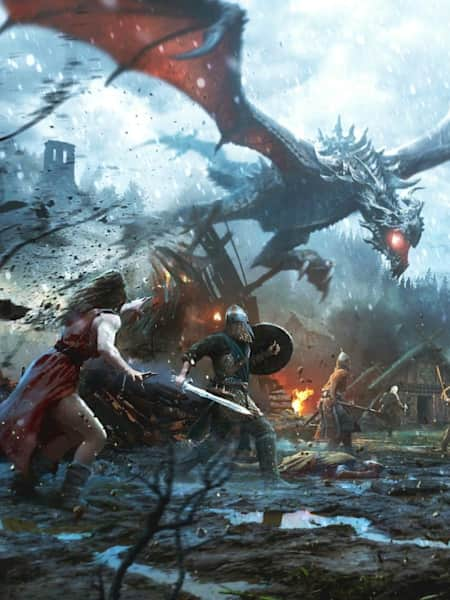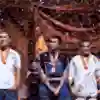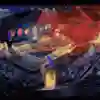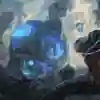Gaming
Quake Champions was certainly the competitive star of QuakeCon 2018, and appropriately so given the legacy of the annual convention; however, Bethesda also used the event to cap off the largest esports effort to date for The Elder Scrolls: Legends, the free-to-play digital card game based on the legendary role-playing series.
The Legends Masters Series brought together 16 of the world's best online players for a two-day live finals showdown, which crowned the game's first major champion and awarded US$50,000 in prizes along the way. That might be small fry compared to Blizzard's Hearthstone, Bethesda's most obvious competition, but Legends is still ramping up its esports scene – and the publisher sees a bright future ahead.
During this year’s QuakeCon in Texas, we spoke with Bethesda employees and Masters Series champion, William 'plzdonhakme' Lu, to get their take on how far The Elder Scrolls: Legends competition has come to date – and how much further it could go in the months and years ahead.
Making Masters
The Elder Scrolls: Legends Masters Series finals
© 2018 Bethesda Softworks LLC. All Rights Reserved. | Fred.Camera
Bethesda first rolled out tournaments for The Elder Scrolls: Legends when the game entered open beta in 2016, and held a live competition at PAX West that year. But following last year's official release of the game, we've seen them gradually build up more competitive steam via online tournaments and other grassroots efforts, rather than immediately pour a bunch of money into a huge, flashy event.
With QuakeCon 2018 nearing, the publisher viewed the convention – which was originally founded in 1996 around the premise of competitive LAN gaming – as an opportunity to take the next step with The Elder Scrolls: Legends esports.
"We'd been doing a number of more grassroots events here and there, and they were essentially one-offs. We really wanted to do something with an eye towards QuakeCon, because this is in a lot of ways where esports started," explains Pete Hines, Bethesda's senior vice president of global marketing and communications. "We wanted to do something of bigger significance to make a statement that, look, we're planning on evolving Legends from what it has been, which is these smaller, grassroots things."
And thus, the Masters Series was born. Open qualifiers kicked off in late June, with four online events allowing anyone to try and claim a spot at the QuakeCon finals. The top three finalists in each qualifier earned the trip to Texas for the finals, with the last few slots awarded to the four players who had amassed the most Masters Points by the end of the qualifying process. The resulting finals showcased the world's best Legends players, and truly featured an international line-up: the top eight all hailed from different countries.
"It's just been a ton of fun to watch those events unfold – really high-level play with really good, high-calibre players," says Hines, himself a longtime fan of card games like Magic: The Gathering. "Great matches with really complex board states and really interesting choices folks have to make. It's been a ton of fun for me to sit back and watch."
When we spoke with Hines early on the final day of the Masters Series tournament, he excitedly recalled a moment from the day prior that demonstrated the exciting potential of Legends as a high-level competitive experience for viewers.
"There was a match yesterday that [Bernardo ‘ILiKePaStA’ Battistotti] lost – it was a win-and-in for today. It was 2-2, and he's playing a more aggro deck, and he gets his opponent to where he's one point short of lethal… and just cannot draw to push through that last point of damage," Hines recalls. "His opponent is mad scrambling to just counter everything that he does, because he's basically dead. It was some of the most intense gaming. I know it's a card game, but it was so awesome to watch how they had to play through these scenarios."
Crowning a champ
William 'plzdonhakme' Lu won the Masters Series finals
© 2018 Bethesda Softworks LLC. All Rights Reserved. | Fred.Camera
The tense match-ups continued into day two, and finally to the grand finals, in which Canadian player plzdonhakme battled against Bulgaria’s Ilia 'Karakondzhul' Iliev. Plzdonhakme got off to a roaring start, taking the first two matches in pretty efficient fashion, but couldn't seal the deal in game three or four. Karakondzhul pushed the series to the limit in game five, but ultimately conceded the victory once it was clear that Lu was in position to clinch the win.
And thus, plzdonhakme was crowned the first Elder Scrolls: Legends Masters Series champion, claiming US$20,000 alongside the trophy. He's hardly a seasoned esports pro, but likewise, Legends is hardly an established esport at this point. Plzdonhakme is a finance student in college who ground through qualifiers while on summer break, and when asked onstage what he'd spend the money on, he responded, "Probably student debt."
According to Christian Van Hoose, Bethesda's community manager for Legends and a Masters Series analyst, plzdonhakme was clearly primed for a successful weekend – even if the grand finals event ended up being "a nail-biter." Plzdonhakme has consistently landed near the top of the ranked ladder, streams his play often, and also played and prepared with a competitive team for the event.
"He's an incredibly strong player, and he recently joined Team Rankstar," Van Hoose explains. "Seeing the emergence of these play groups and seeing the dedication that he and his team-mates have to testing, I think we're going to see more of that. People who test and develop groups to do that, they're going to see the most success in these huge events like this."
Plzdonhakme affirmed his commitment to preparation ahead of the event, saying that at one point he put in a solid week of almost 10-hour days before taking a breather. "I think I've spent more time than probably most people. I spent a ridiculous amount of time – I don't have a job. I had that going for me. School is out," he says. "I practise a lot with my team-mate Endo and we managed to discuss and test a lot of match-ups and games, and edit our decks. Only after weeks of hours and hours did I finally end up with a line-up and I was relatively happy with it."
Surprisingly, plzdonhakme doesn't have a deep history with competitive card games. He previously dabbled in Hearthstone, but prior to really committing to The Elder Scrolls: Legends, he didn't appreciate the tactical component of the genre. In fact, he credits Van Hoose's YouTube channel with turning him onto the deeper elements of Legends. "It was just enlightening to me," Lu affirms. "I found out that there was strategy in this game."
"About a year ago, when I was first learning the game, it felt really intimidating. A lot of these people are card gamers; they come from Magic with years of experience. At the start, I didn't even really know deck archetypes, or any strategy behind deck-building," he says. "It was definitely pretty intimidating, but I put in the time and really tried to think through the logic of all of my decisions. Improving is definitely within reach. It brought me here."
Next steps
Where will The Elder Scrolls: Legends take plzdonhakme and other top players next? Bethesda have big plans for the game's competitive side, and Hines suggests that community interest around the Masters Series tournament was proof that it's worth the investment. "The number of folks that have been tuning in and watching, the response so far," he says, "I think it's making the case for, 'Yeah, we have to do this.'"
Legends is primed for significant evolution and expansion in the months ahead, beyond the increased esports push. In May, Sparkypants Studios took over from original Legends developer Dire Wolf Digital, and the game will see a "much more interesting and dynamic" client in the near future, says Hines. He also mentioned improved options for streamers, as well as custom tournament support.
The Elder Scrolls: Legends is also coming to consoles, and at QuakeCon, Bethesda revealed Isle of Madness, the game's fourth expansion. Bethesda believe that all of those changes and additions will build momentum around Legends, some of which will could potentially funnel into increased interest and participation in the increasing esports efforts. Even so, Hines is quick to caution that Bethesda doesn't want to rapidly ramp up the stakes.
"The one thing that we want to be really careful about is doing it at the right pace. We really do want to crawl, walk, and then run, and I think what you're seeing here is the first stages of us starting to walk. We don't want to get ahead of ourselves and do a full-on sprint, like, '$10 million!" No, we're going to go slowly and right, and talk to our players about what they like," he suggests. "It needs to be a conversation, and it needs to be done at the right pace."
It'll be a gradual push towards larger-scale esports efforts, and one that attempts to service the entire span of competitive interest – from grassroots, entry-level matches all the way up to Masters Series-like showdowns of the best of the best. Bethesda hope to encourage a path to pro for dedicated newcomers, kind of like the one taken by plzdonhakme, but they also want to set a high-level example even just for Legends fans who want to watch.
"It's definitely something that we feel is important for both attracting and retaining players of all skill levels," he affirms. "Even if you're not good enough to make it here for the final eight at QuakeCon, being able to see those players and those decks does a lot for appreciating the game more. Getting to watch really high-level players compete does a lot for holding onto players."
Is there room in the esports scene for another fantasy card-battler? Hearthstone commands a sizable audience, The Witcher spinoff Gwent is eyeing its own competitive future, plus Valve's own Dota 2-inspired Artifact will launch later this year – and we've seen the kind of influence and force that Valve wield in the esports space. Van Hoose points to the alluring lore behind Legends, but also suggests that the added depth from its myriad unique play elements – including the multi-lane board, as well as runes and prophecy systems – could give it an edge.
What's after the Masters Series, then? Hines suggests that they'll evaluate the weekend and see what worked or what might need refinement, and then battle-plan next steps. Again, they're optimistic about Legends esports, but it still feels like early days – there's plenty of potential ahead of Bethesda, and they don't want to speed too quickly to the next milestone.
"[We'll] lay out a roadmap for the next year or 18 months – not just through 2018 but through 2019 to say, 'These are the kinds of things we want to do, and how we want to build to what QuakeCon looked like last year,'" he says. "We want to make sure we're taking our time, and not taking too many leaps forward and skipping over some important steps."












